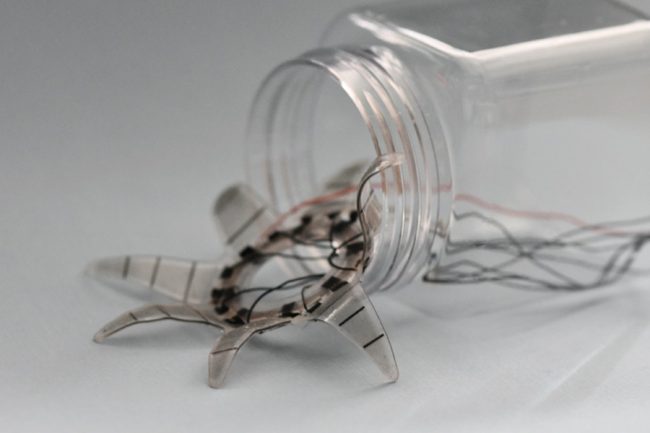
FEBRUARY 23, 2022 • By Tyler Irving
The word ‘robot’ usually conjures up an image of a metal machine, but according to Professor Mihai Duduta (MIE), in the future these devices could have an altogether different look.
Duduta and his team are experts in soft robotics, developing stretchable, elastic devices for a range of applications.
“You can imagine novel medical devices designed to be compatible with the human body, adaptable buildings that change with environmental conditions, or new ways to harvest or store energy,” says Duduta. “The field also includes collaborative or assistive robotics used in advanced manufacturing, and even personal robotic companions.”
The common thread is the need for new types of materials, ones that are more flexible than metal, but retain the ability to provide the electricity that robots need to run.
“Finding a material that is as stretchable as a rubber band and can still conduct electricity is a major challenge,” says Duduta.
New funding announced today by the Canada Foundation for Innovation (CFI) could help address that. Duduta’s project — Fabrication and characterization of soft, conductive materials for sensing, actuation and energy storage — is one of three at U of T Engineering that received support from CFI’s John R. Evans Leaders Fund.
“Through this project we will identify new materials and discover new classes of artificial muscles, soft sensors, and even stretchable batteries,” says Duduta.
Another funded project — Computational biomarkers indicative of swallowing and gait functional declines — is headed by Professor Ervin Sejdić (ECE).
Sejdić’s research team and clinical partners aim to harness the power of machine learning and artificial intelligence help Canadians who have difficulty swallowing or walking.
“Canada’s population is aging, and chronic conditions such as swallowing and gait functional losses are on the rise,” says Sejdić. “Between seven and eight million Canadians are predicted to suffer from these disorders by 2031.”
These disorders are currently difficult to assess and manage, in part because there are few established protocols for doing so. Sejdić and his team plan to create novel human-machine interfaces that will capture and process multiple physiological signals.
By analyzing the data generated from these devices using advanced machine-learning methods, the team hopes to develop what they call ‘computational biomarkers’ that can be used to predict the continuum of functional losses.
“Our work innovatively combines rehabilitation, physical therapy, speech-language pathology, geriatrics, cyber-physical systems and data analytics,” says Sejdić. “This support will enable this highly multidisciplinary team to acquire the necessary equipment and complete research that will one day be translated into clinically applicable tools.”
“Health care issues in particular require ambitious solutions across a host of disciplines,” says ECE Chair Professor Deepa Kundur. “Increasingly, the tools of electrical and computer engineering, such as machine learning, help disparate disciplines dialogue with one another. Professor Sejdić’s research is a perfect example of this.”
The third U of T Engineering project is Picture This: A multi-organ imaging bank for childhood disability-specific protocols and outcomes, led by Professor Tom Chau (BME).
In total, today’s announcement from CFI includes a total of 150 projects at 43 universities, colleges, cégeps and polytechnics across Canada, funded by both the JELF and the College-Industry Innovation Fund.
Story from U of T Engineering News, with files from Matthew Tierney
For more information:
Jessica MacInnis
External Relations Manager
The Edward S. Rogers Sr. Department of Electrical & Computer Engineering
416-978-7997 | jessica.macinnis@utoronto.ca